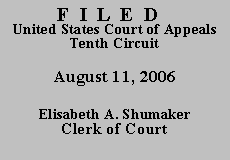

| ALAN KINGSLEY,
v.
DAVID R. MCKUNE, Warden,
Lansing Correctional Facility;
ATTORNEY GENERAL OF THE
STATE OF KANSAS |
|
In fall 1991, a jury convicted Mr. Kingsley of first-degree murder, aggravated robbery, aggravated arson, and forgery in Sedgwick County District Court, Kansas. See State v. Kingsley, 851 P.2d 370, 372-74 (Kan. 1993). He was sentenced to life without parole for 40 years, 15 years to life, 15 years to life, and 1 to 5 years, respectively. Id. at 372. After successfully challenging his conviction for aggravated arson, Mr. Kinglsey was re-sentenced on April 27, 1993, for the lesser included offense of arson. On February 21, 2002, he filed an application for post-conviction relief in state court, which was denied without an evidentiary hearing in June 2002. That denial was affirmed by the Kansas Court of Appeals on April 2, 2004, and the Kansas Supreme Court on May 25, 2004.
On January 11, 2005, Mr. Kingsley filed his federal habeas petition. See R. Doc. 1. On November 17, 2005, without addressing Mr. Kingsley's constitutional claims, the district court dismissed his habeas petition as time-barred by the one-year limitations period in 28 U.S.C. § 2244(d)(1). R. Doc. 25. Mr. Kingsley filed several motions for reconsideration, which the district court denied.
When the district court denies a habeas petition on procedural grounds and fails to address the prisoner's constitutional claims, we may issue a COA only if the prisoner demonstrates that it is reasonably debatable whether (1) the petition states a valid claim of the denial of a constitutional right, and (2) the district court's procedural ruling is correct. Slack, 529 U.S. at 484. On appeal, Mr. Kingsley argues the merits of his claims and that the district court erred in determining that his action is barred by limitations.
The district court's conclusion that Mr. Kingsley's claims are time-barred is not reasonably debatable. Title 28 U.S.C. § 2244(d)(1), enacted on April 24, 1996, provides that a "1-year period of limitation shall apply to an application for a writ of habeas corpus by a person in custody pursuant to the judgment of a State court." This limitation period usually commences on "the date on which the judgment became final by . . . the expiration of the time for seeking [direct] review." 28 U.S.C. §2244(d)(1)(A). However, a state prisoner whose conviction became final on or before April 24, 1996 must file his § 2254 petition on or before April 24, 1997. See United States v. Hurst, 322 F.3d 1256, 1260 (10th Cir. 2003); Hoggro v. Boone, 150 F.3d 1223, 1226 (10th Cir. 1998). Because Mr. Kingsley's conviction became final before April 24, 1996, he had until April 24, 1997 to file his § 2254 petition. He did not file his § 2254 petition until January 11, 2005, well past the deadline.(1)
The running of the limitations period would be tolled or suspended during the pendency of any post-conviction or other collateral proceeding filed during the one-year limitations period. See Hoggro, 150 F.3d at 1226. But a petition for post-conviction relief filed in state court after the limitations period has expired no longer serves to toll it. See Fisher v. Gibson, 262 F.3d 1135, 1142-43 (10th Cir. 2001). Thus, Mr. Kingsley's February 21, 2002 application for post-conviction relief is of no consequence. And although the limitations period for § 2254 petitions is subject to equitable tolling in extraordinary circumstances, Gibson v. Klinger, 232 F.3d 799, 808 (10th Cir. 2000), Mr. Kingsley's conclusory claims of actual innocence do not support tolling here.
Mr. Kingsley's remaining arguments may be handled quickly. He contends that this court should dismiss his petition without prejudice because he filed a collateral proceeding in state court that is still pending. That is, he maintains his habeas petition here was prematurely filed. As noted, because the one-year limitations period expired on April 24, 1997, any subsequent state collateral proceedings have no bearing on whether his habeas petition is untimely.
Mr. Kingsley also seeks return of the $255.00 filing fee he submitted to this court in connection with his interlocutory appeal, which was dismissed for lack of appellate jurisdiction on June 27, 2005. He maintains that "if the court does not have jurisdiction to hear the appeal, it does not have jurisdiction to collect the funds for the appeal." Aplt. Br. at 3f. This court has jurisdiction to ascertain its jurisdiction, Schroeck v. Gonzales, 429 F.3d 947, 950 (10th Cir. 2005), and to retain the attendant filing fee.
We DENY IFP status, DENY a COA, and DISMISS this appeal.
Entered for the Court
Paul J. Kelly, Jr.
Circuit Judge
1. Mr. Kingsley makes much out of the State's failure to answer his petition within the 20-day period provided by the district court. He contends that under local rules such failure should have resulted in his habeas petition being "granted as uncontested." Aplt. Br. at 3e. Mr. Kingsley's contention is without consequence. Regardless of the State's response, timely or otherwise, the district court retained the authority to dismiss his petition as untimely. See Day v. McDonough, 126 S. Ct. 1675, 1684 (2006); Dulworth v. Evans, 442 F.3d 1265, 1266 (10th Cir. 2006).